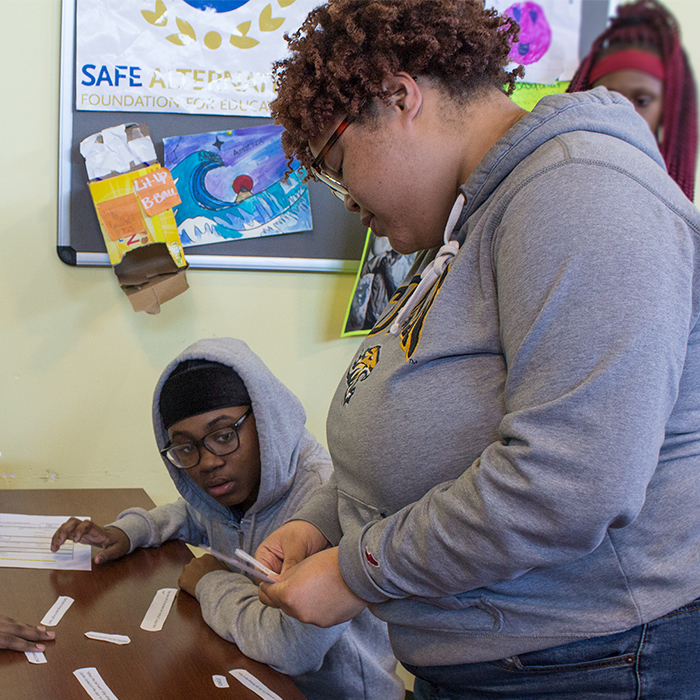Course Offerings
Grantwriting In Valued Environments Project
Grantwriting in Valued Environments (G.I.V.E.)
is a BTU Priority Investment in the English Department’s undergraduate major and graduate professional writing program that advances students' professional writing goals by connecting their coursework to the writing needs of small, nonprofit organizations (NPOs) in the Baltimore region.
Guiding Principles & Commitments
According to a racial equity survey conducted by Maryland Nonprofits, 60% of NPOs in MD with less than $25,000 in revenue are led by people of color. By contrast, 87% of Maryland NPOs with over $5 million are led by people who identify as white. This type of disparity is what motivates G.I.V.E. Our aim is to leverage and redistribute resources to local organizations led by people of color to create a philanthropic standard that allows every community to thrive.
We acknowledge the generations of injustice in Maryland by working within an anti-racist,
anti-colonial framework to ethically and equitably empower our community partners,
their constituents, and TU students. By centering the needs and expertise of organizations
led by people of color, we disavow the legacy of white supremacy, settler colonialism,
and violence that has been institutionalized and embedded in our culture.
We are committed to creating spaces that resist the ideologies (racism, sexism, transphobia,
homophobia, classism, ableism, Islamophobia, anti-Semitism, xenophobia) that perpetuate
harmful practices impacting us and our communities.
Our commitments
- Centering grassroots, particularly Black-led, organizations to fulfill their visions for change.
- Prioritizing the goals, viewpoints, and authority of these organizations and communities at all times.
- Providing professional development opportunities for TU student writers interested in advocacy, grant-writing, and nonprofits.
- Leveraging Towson University’s resources for distributive justice within an acknowledgment of our role in historical inequity.
- Uplifting local community knowledge and historically marginalized voices.
Our purpose
- Offer small community NPOs in the Baltimore region greater opportunity to succeed in a competitive philanthropic economy.
- Research, write, submit, and track grants for our partners.
- Provide narrative and text that tells an organization’s story.
- Write and create content in various genres such as web content, reports, newsletters, etc.
- Develop students’ professional goals related to the nonprofit sector.
Impact
- G.I.V.E. participants have raised over 1 million dollars in grants for NPOs in the Baltimore area. Participating TU students have been hired
as grant/proposal writers and grant administrators by:
- Cal Ripken Foundation
- The CASH Campaign of Maryland
- Community College of Baltimore County
- Family Survivor Network
- FEi Systems
- Fly by Light
- The Harry and Jeanette Weinberg Foundation
- Johns Hopkins University
- Kittleson & Associates
- The Maryland Food Bank
- The National Center for Transgender Equality
- Parks & People Foundation
- Power52
- Safe Alternative Foundation for Education
- Vincent De Paul
- Towson University, and more.
G.I.V.E. is embedded within TU undergraduate and graduate curriculum, which means students who enroll in our courses work on projects with real-world, real-time application. These writing and content creation projects range from writing grant proposals to leading writing workshops for G.I.V.E. community partners. G.I.V.E. course offerings include:
ENGL 401 Grant and Advocacy Writing
PRWR 497/498 Internships in English
PRWR 619 Grant and Community Writing
PRWR 629 Content Strategy and Writing for Social Change
PRWR 797 Internship in Professional Writing
Students enrolled will:
–Familiarize themselves with the philanthropic sector and create content that positively
impacts the world –Build professional relationships and develop leadership skills
–Improve professional communication and active listening skills
–Hone language to advocate for and amplify the voices of constituents
–Use privilege and education to convey to others the particular needs of communities
that are less privileged
–Obtain internships, enter graduate school, and land dream jobs
–Transform negative rhetoric surrounding Baltimore communities
The University Community
In its early days in the mid to late 19th century, Towson University—then called the
Maryland State Normal School (a typical name for a teacher’s college at that time)—was
located on Green Street at the corner of Lafayette Square in West Baltimore, an area
in proximity to many of our community partner NPOs. In 1912, The Maryland State Normal
School, spurred by a combination of well-documented racial fears as well as federal
land grants, moved six miles north to its current location in Towson. At the time
of the move out of the City, TU did not admit Black students, and would not until
1955—a year after Brown vs Board’s mandate.
Despite the progress TU has made since, we believe healing happens when TU’s buried history is made visible. By levering and redistributing resources to NPOs and communities in Baltimore, we are attempting to enact an ethical repatriation of resources.
We are especially grateful to our past and current students for their contributions to G.I.V.E. and to BTU for their continued support.
Please contact Dr. Zosha Stuckey (zstuckey@towson.edu) or Dr. Carrie Grant (cgrant@towson.edu)
for more information.
